Legal Issues in Contract and Property Law: Case Studies of Desert Island Discs and Dodo and Pina
VerifiedAdded on 2023/06/15
|9
|2355
|310
AI Summary
This article discusses legal issues in contract and property law through case studies of Desert Island Discs and Dodo and Pina. It covers topics such as offer and acceptance, consumer guarantees, co-ownership, liability for debts, and forgery.
Contribute Materials
Your contribution can guide someone’s learning journey. Share your
documents today.
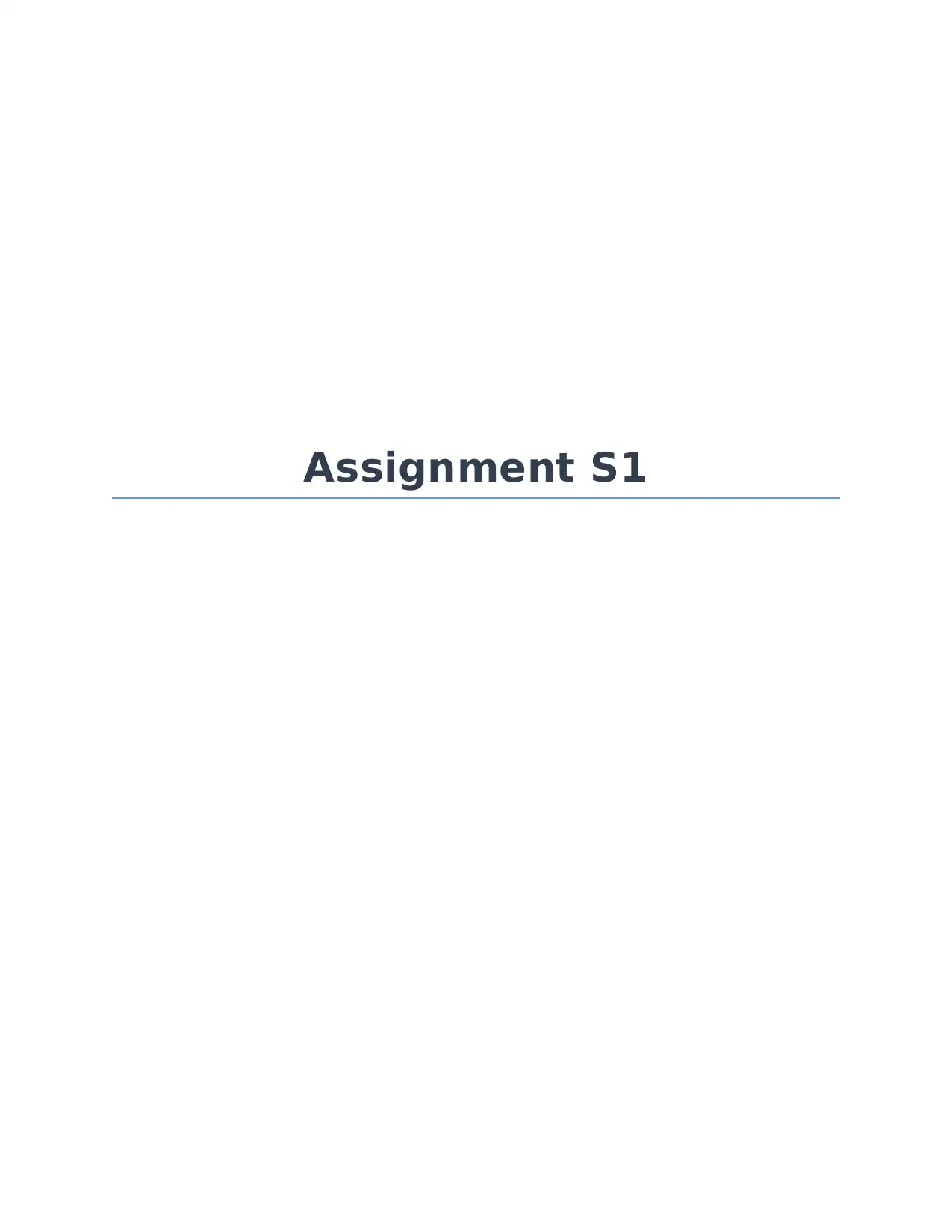
Assignment S1
Secure Best Marks with AI Grader
Need help grading? Try our AI Grader for instant feedback on your assignments.

Table of Contents
Part A...............................................................................................................................................3
Part B...............................................................................................................................................6
References........................................................................................................................................8
Part A...............................................................................................................................................3
Part B...............................................................................................................................................6
References........................................................................................................................................8
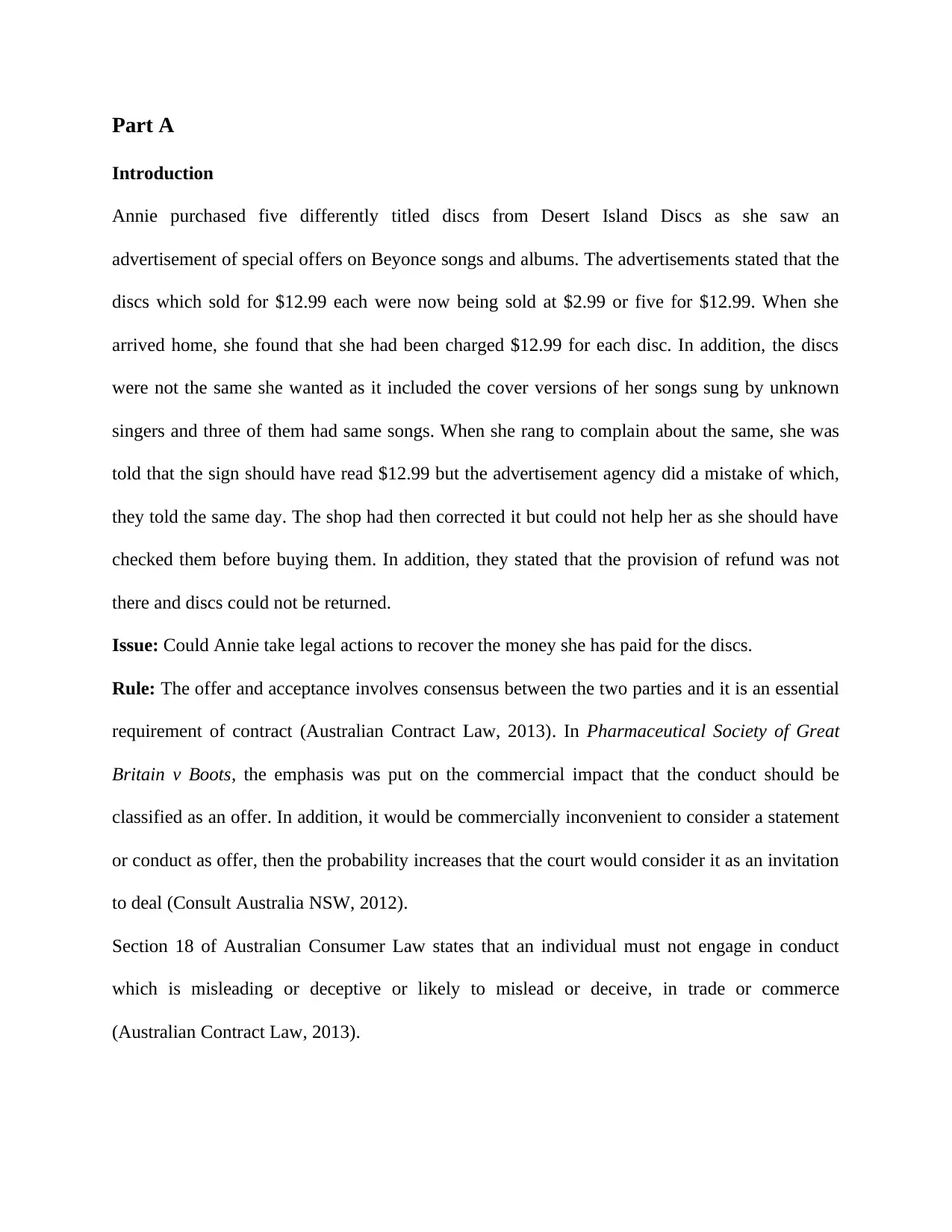
Part A
Introduction
Annie purchased five differently titled discs from Desert Island Discs as she saw an
advertisement of special offers on Beyonce songs and albums. The advertisements stated that the
discs which sold for $12.99 each were now being sold at $2.99 or five for $12.99. When she
arrived home, she found that she had been charged $12.99 for each disc. In addition, the discs
were not the same she wanted as it included the cover versions of her songs sung by unknown
singers and three of them had same songs. When she rang to complain about the same, she was
told that the sign should have read $12.99 but the advertisement agency did a mistake of which,
they told the same day. The shop had then corrected it but could not help her as she should have
checked them before buying them. In addition, they stated that the provision of refund was not
there and discs could not be returned.
Issue: Could Annie take legal actions to recover the money she has paid for the discs.
Rule: The offer and acceptance involves consensus between the two parties and it is an essential
requirement of contract (Australian Contract Law, 2013). In Pharmaceutical Society of Great
Britain v Boots, the emphasis was put on the commercial impact that the conduct should be
classified as an offer. In addition, it would be commercially inconvenient to consider a statement
or conduct as offer, then the probability increases that the court would consider it as an invitation
to deal (Consult Australia NSW, 2012).
Section 18 of Australian Consumer Law states that an individual must not engage in conduct
which is misleading or deceptive or likely to mislead or deceive, in trade or commerce
(Australian Contract Law, 2013).
Introduction
Annie purchased five differently titled discs from Desert Island Discs as she saw an
advertisement of special offers on Beyonce songs and albums. The advertisements stated that the
discs which sold for $12.99 each were now being sold at $2.99 or five for $12.99. When she
arrived home, she found that she had been charged $12.99 for each disc. In addition, the discs
were not the same she wanted as it included the cover versions of her songs sung by unknown
singers and three of them had same songs. When she rang to complain about the same, she was
told that the sign should have read $12.99 but the advertisement agency did a mistake of which,
they told the same day. The shop had then corrected it but could not help her as she should have
checked them before buying them. In addition, they stated that the provision of refund was not
there and discs could not be returned.
Issue: Could Annie take legal actions to recover the money she has paid for the discs.
Rule: The offer and acceptance involves consensus between the two parties and it is an essential
requirement of contract (Australian Contract Law, 2013). In Pharmaceutical Society of Great
Britain v Boots, the emphasis was put on the commercial impact that the conduct should be
classified as an offer. In addition, it would be commercially inconvenient to consider a statement
or conduct as offer, then the probability increases that the court would consider it as an invitation
to deal (Consult Australia NSW, 2012).
Section 18 of Australian Consumer Law states that an individual must not engage in conduct
which is misleading or deceptive or likely to mislead or deceive, in trade or commerce
(Australian Contract Law, 2013).
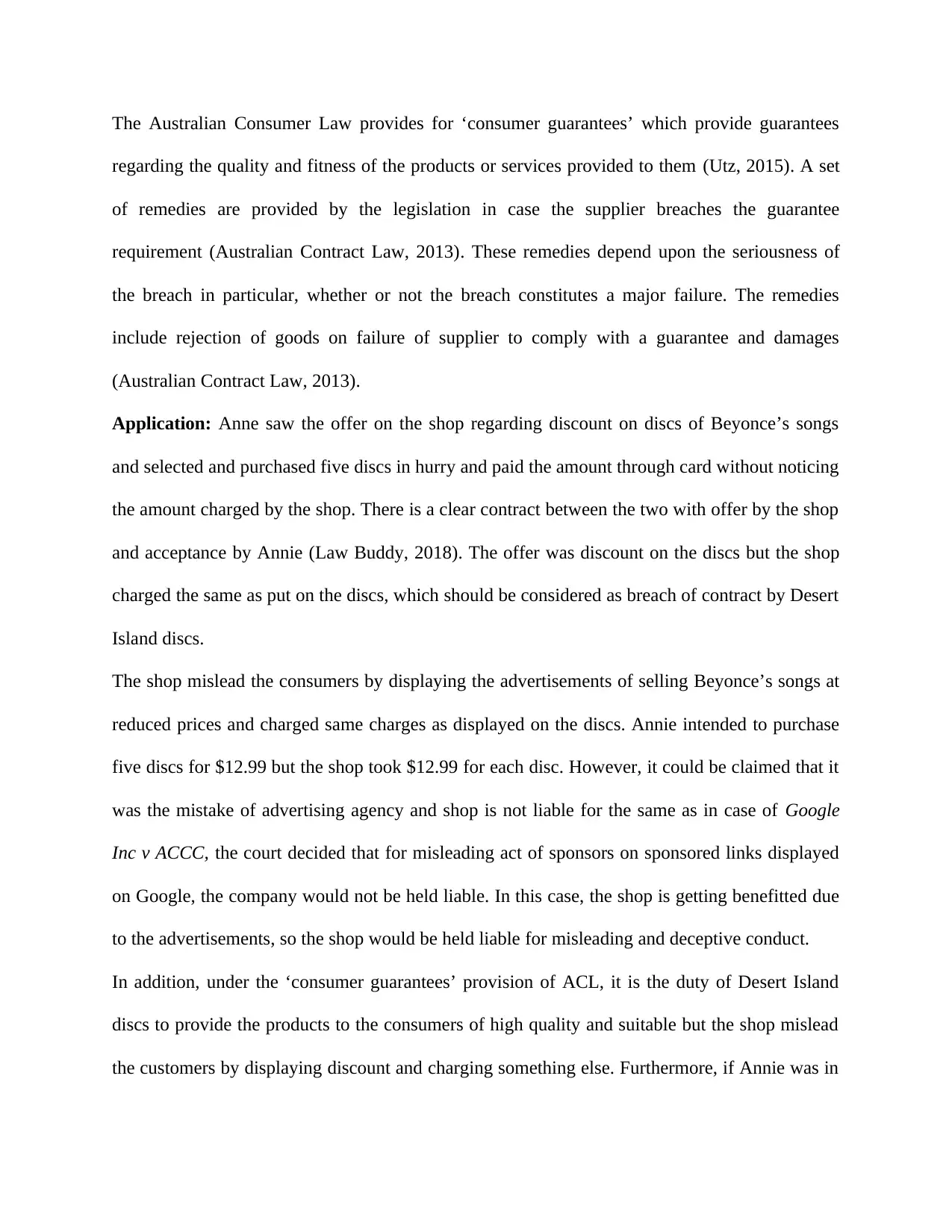
The Australian Consumer Law provides for ‘consumer guarantees’ which provide guarantees
regarding the quality and fitness of the products or services provided to them (Utz, 2015). A set
of remedies are provided by the legislation in case the supplier breaches the guarantee
requirement (Australian Contract Law, 2013). These remedies depend upon the seriousness of
the breach in particular, whether or not the breach constitutes a major failure. The remedies
include rejection of goods on failure of supplier to comply with a guarantee and damages
(Australian Contract Law, 2013).
Application: Anne saw the offer on the shop regarding discount on discs of Beyonce’s songs
and selected and purchased five discs in hurry and paid the amount through card without noticing
the amount charged by the shop. There is a clear contract between the two with offer by the shop
and acceptance by Annie (Law Buddy, 2018). The offer was discount on the discs but the shop
charged the same as put on the discs, which should be considered as breach of contract by Desert
Island discs.
The shop mislead the consumers by displaying the advertisements of selling Beyonce’s songs at
reduced prices and charged same charges as displayed on the discs. Annie intended to purchase
five discs for $12.99 but the shop took $12.99 for each disc. However, it could be claimed that it
was the mistake of advertising agency and shop is not liable for the same as in case of Google
Inc v ACCC, the court decided that for misleading act of sponsors on sponsored links displayed
on Google, the company would not be held liable. In this case, the shop is getting benefitted due
to the advertisements, so the shop would be held liable for misleading and deceptive conduct.
In addition, under the ‘consumer guarantees’ provision of ACL, it is the duty of Desert Island
discs to provide the products to the consumers of high quality and suitable but the shop mislead
the customers by displaying discount and charging something else. Furthermore, if Annie was in
regarding the quality and fitness of the products or services provided to them (Utz, 2015). A set
of remedies are provided by the legislation in case the supplier breaches the guarantee
requirement (Australian Contract Law, 2013). These remedies depend upon the seriousness of
the breach in particular, whether or not the breach constitutes a major failure. The remedies
include rejection of goods on failure of supplier to comply with a guarantee and damages
(Australian Contract Law, 2013).
Application: Anne saw the offer on the shop regarding discount on discs of Beyonce’s songs
and selected and purchased five discs in hurry and paid the amount through card without noticing
the amount charged by the shop. There is a clear contract between the two with offer by the shop
and acceptance by Annie (Law Buddy, 2018). The offer was discount on the discs but the shop
charged the same as put on the discs, which should be considered as breach of contract by Desert
Island discs.
The shop mislead the consumers by displaying the advertisements of selling Beyonce’s songs at
reduced prices and charged same charges as displayed on the discs. Annie intended to purchase
five discs for $12.99 but the shop took $12.99 for each disc. However, it could be claimed that it
was the mistake of advertising agency and shop is not liable for the same as in case of Google
Inc v ACCC, the court decided that for misleading act of sponsors on sponsored links displayed
on Google, the company would not be held liable. In this case, the shop is getting benefitted due
to the advertisements, so the shop would be held liable for misleading and deceptive conduct.
In addition, under the ‘consumer guarantees’ provision of ACL, it is the duty of Desert Island
discs to provide the products to the consumers of high quality and suitable but the shop mislead
the customers by displaying discount and charging something else. Furthermore, if Annie was in
Secure Best Marks with AI Grader
Need help grading? Try our AI Grader for instant feedback on your assignments.
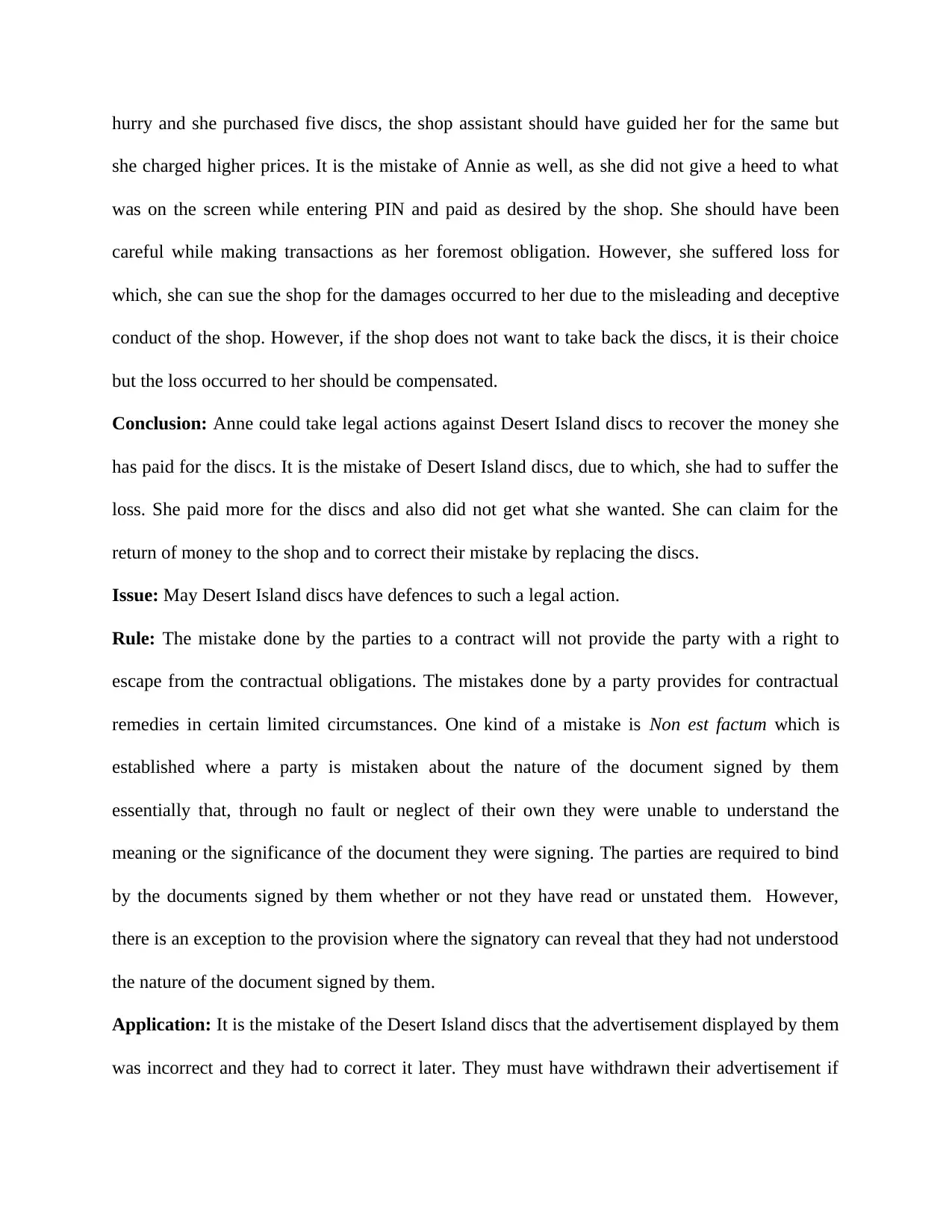
hurry and she purchased five discs, the shop assistant should have guided her for the same but
she charged higher prices. It is the mistake of Annie as well, as she did not give a heed to what
was on the screen while entering PIN and paid as desired by the shop. She should have been
careful while making transactions as her foremost obligation. However, she suffered loss for
which, she can sue the shop for the damages occurred to her due to the misleading and deceptive
conduct of the shop. However, if the shop does not want to take back the discs, it is their choice
but the loss occurred to her should be compensated.
Conclusion: Anne could take legal actions against Desert Island discs to recover the money she
has paid for the discs. It is the mistake of Desert Island discs, due to which, she had to suffer the
loss. She paid more for the discs and also did not get what she wanted. She can claim for the
return of money to the shop and to correct their mistake by replacing the discs.
Issue: May Desert Island discs have defences to such a legal action.
Rule: The mistake done by the parties to a contract will not provide the party with a right to
escape from the contractual obligations. The mistakes done by a party provides for contractual
remedies in certain limited circumstances. One kind of a mistake is Non est factum which is
established where a party is mistaken about the nature of the document signed by them
essentially that, through no fault or neglect of their own they were unable to understand the
meaning or the significance of the document they were signing. The parties are required to bind
by the documents signed by them whether or not they have read or unstated them. However,
there is an exception to the provision where the signatory can reveal that they had not understood
the nature of the document signed by them.
Application: It is the mistake of the Desert Island discs that the advertisement displayed by them
was incorrect and they had to correct it later. They must have withdrawn their advertisement if
she charged higher prices. It is the mistake of Annie as well, as she did not give a heed to what
was on the screen while entering PIN and paid as desired by the shop. She should have been
careful while making transactions as her foremost obligation. However, she suffered loss for
which, she can sue the shop for the damages occurred to her due to the misleading and deceptive
conduct of the shop. However, if the shop does not want to take back the discs, it is their choice
but the loss occurred to her should be compensated.
Conclusion: Anne could take legal actions against Desert Island discs to recover the money she
has paid for the discs. It is the mistake of Desert Island discs, due to which, she had to suffer the
loss. She paid more for the discs and also did not get what she wanted. She can claim for the
return of money to the shop and to correct their mistake by replacing the discs.
Issue: May Desert Island discs have defences to such a legal action.
Rule: The mistake done by the parties to a contract will not provide the party with a right to
escape from the contractual obligations. The mistakes done by a party provides for contractual
remedies in certain limited circumstances. One kind of a mistake is Non est factum which is
established where a party is mistaken about the nature of the document signed by them
essentially that, through no fault or neglect of their own they were unable to understand the
meaning or the significance of the document they were signing. The parties are required to bind
by the documents signed by them whether or not they have read or unstated them. However,
there is an exception to the provision where the signatory can reveal that they had not understood
the nature of the document signed by them.
Application: It is the mistake of the Desert Island discs that the advertisement displayed by them
was incorrect and they had to correct it later. They must have withdrawn their advertisement if
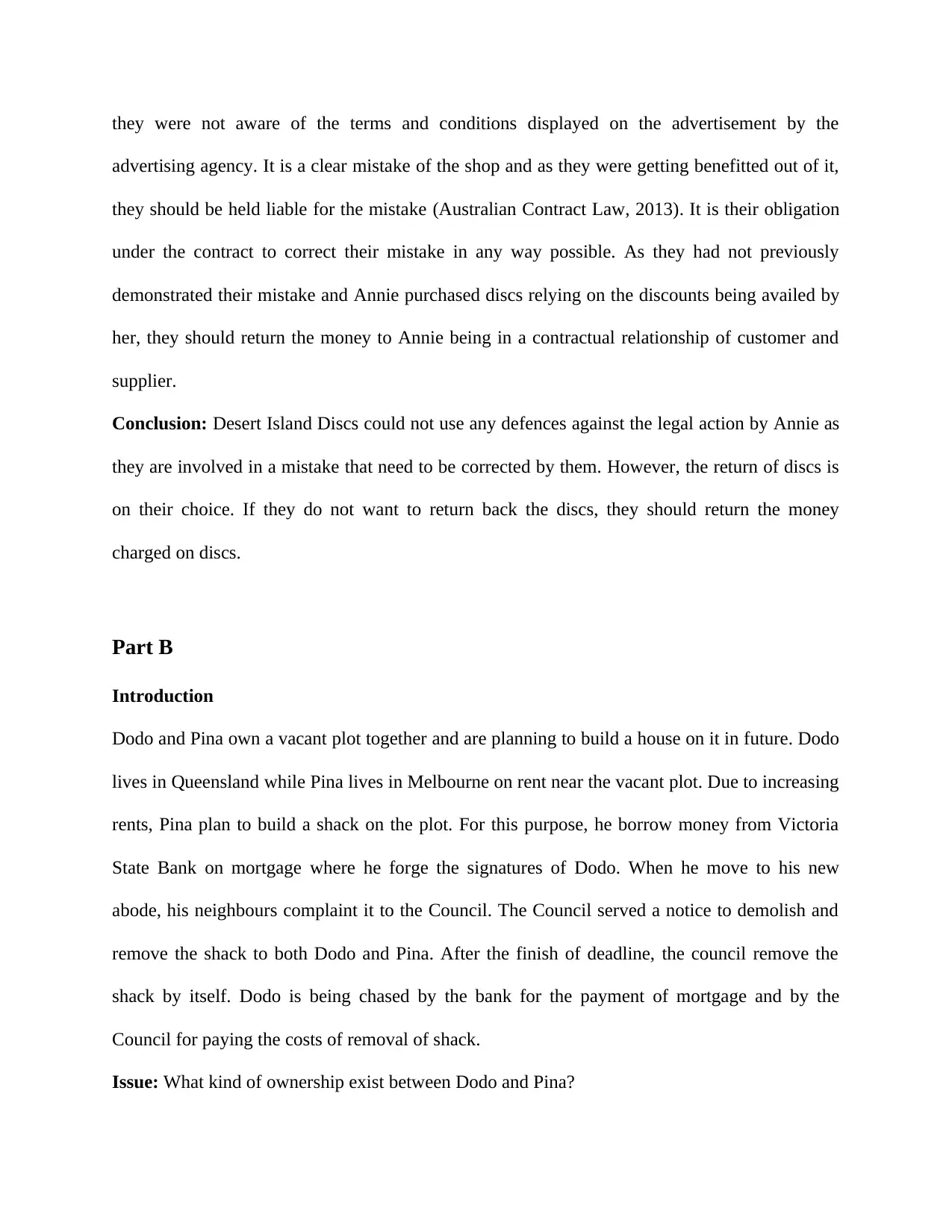
they were not aware of the terms and conditions displayed on the advertisement by the
advertising agency. It is a clear mistake of the shop and as they were getting benefitted out of it,
they should be held liable for the mistake (Australian Contract Law, 2013). It is their obligation
under the contract to correct their mistake in any way possible. As they had not previously
demonstrated their mistake and Annie purchased discs relying on the discounts being availed by
her, they should return the money to Annie being in a contractual relationship of customer and
supplier.
Conclusion: Desert Island Discs could not use any defences against the legal action by Annie as
they are involved in a mistake that need to be corrected by them. However, the return of discs is
on their choice. If they do not want to return back the discs, they should return the money
charged on discs.
Part B
Introduction
Dodo and Pina own a vacant plot together and are planning to build a house on it in future. Dodo
lives in Queensland while Pina lives in Melbourne on rent near the vacant plot. Due to increasing
rents, Pina plan to build a shack on the plot. For this purpose, he borrow money from Victoria
State Bank on mortgage where he forge the signatures of Dodo. When he move to his new
abode, his neighbours complaint it to the Council. The Council served a notice to demolish and
remove the shack to both Dodo and Pina. After the finish of deadline, the council remove the
shack by itself. Dodo is being chased by the bank for the payment of mortgage and by the
Council for paying the costs of removal of shack.
Issue: What kind of ownership exist between Dodo and Pina?
advertising agency. It is a clear mistake of the shop and as they were getting benefitted out of it,
they should be held liable for the mistake (Australian Contract Law, 2013). It is their obligation
under the contract to correct their mistake in any way possible. As they had not previously
demonstrated their mistake and Annie purchased discs relying on the discounts being availed by
her, they should return the money to Annie being in a contractual relationship of customer and
supplier.
Conclusion: Desert Island Discs could not use any defences against the legal action by Annie as
they are involved in a mistake that need to be corrected by them. However, the return of discs is
on their choice. If they do not want to return back the discs, they should return the money
charged on discs.
Part B
Introduction
Dodo and Pina own a vacant plot together and are planning to build a house on it in future. Dodo
lives in Queensland while Pina lives in Melbourne on rent near the vacant plot. Due to increasing
rents, Pina plan to build a shack on the plot. For this purpose, he borrow money from Victoria
State Bank on mortgage where he forge the signatures of Dodo. When he move to his new
abode, his neighbours complaint it to the Council. The Council served a notice to demolish and
remove the shack to both Dodo and Pina. After the finish of deadline, the council remove the
shack by itself. Dodo is being chased by the bank for the payment of mortgage and by the
Council for paying the costs of removal of shack.
Issue: What kind of ownership exist between Dodo and Pina?
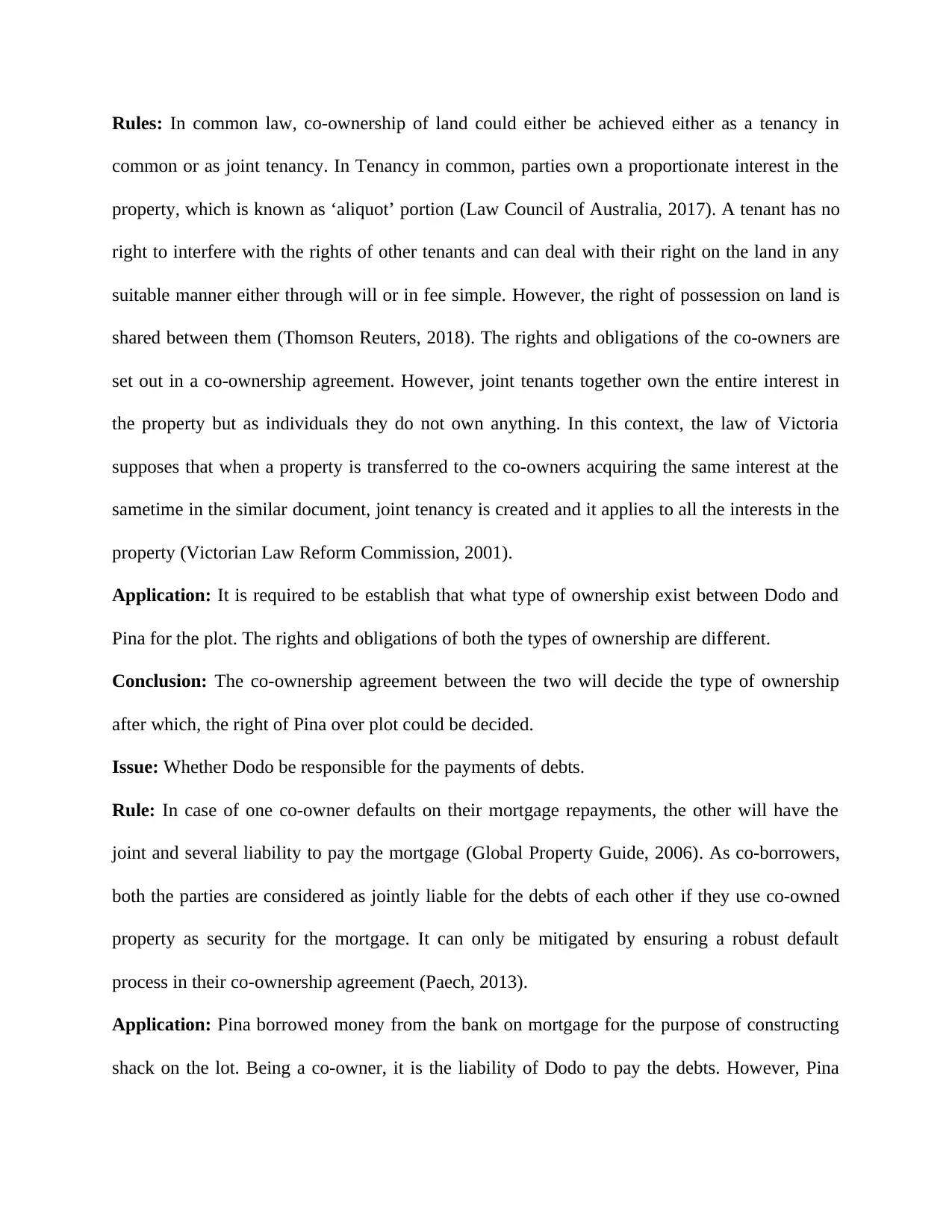
Rules: In common law, co-ownership of land could either be achieved either as a tenancy in
common or as joint tenancy. In Tenancy in common, parties own a proportionate interest in the
property, which is known as ‘aliquot’ portion (Law Council of Australia, 2017). A tenant has no
right to interfere with the rights of other tenants and can deal with their right on the land in any
suitable manner either through will or in fee simple. However, the right of possession on land is
shared between them (Thomson Reuters, 2018). The rights and obligations of the co-owners are
set out in a co-ownership agreement. However, joint tenants together own the entire interest in
the property but as individuals they do not own anything. In this context, the law of Victoria
supposes that when a property is transferred to the co-owners acquiring the same interest at the
sametime in the similar document, joint tenancy is created and it applies to all the interests in the
property (Victorian Law Reform Commission, 2001).
Application: It is required to be establish that what type of ownership exist between Dodo and
Pina for the plot. The rights and obligations of both the types of ownership are different.
Conclusion: The co-ownership agreement between the two will decide the type of ownership
after which, the right of Pina over plot could be decided.
Issue: Whether Dodo be responsible for the payments of debts.
Rule: In case of one co-owner defaults on their mortgage repayments, the other will have the
joint and several liability to pay the mortgage (Global Property Guide, 2006). As co-borrowers,
both the parties are considered as jointly liable for the debts of each other if they use co-owned
property as security for the mortgage. It can only be mitigated by ensuring a robust default
process in their co-ownership agreement (Paech, 2013).
Application: Pina borrowed money from the bank on mortgage for the purpose of constructing
shack on the lot. Being a co-owner, it is the liability of Dodo to pay the debts. However, Pina
common or as joint tenancy. In Tenancy in common, parties own a proportionate interest in the
property, which is known as ‘aliquot’ portion (Law Council of Australia, 2017). A tenant has no
right to interfere with the rights of other tenants and can deal with their right on the land in any
suitable manner either through will or in fee simple. However, the right of possession on land is
shared between them (Thomson Reuters, 2018). The rights and obligations of the co-owners are
set out in a co-ownership agreement. However, joint tenants together own the entire interest in
the property but as individuals they do not own anything. In this context, the law of Victoria
supposes that when a property is transferred to the co-owners acquiring the same interest at the
sametime in the similar document, joint tenancy is created and it applies to all the interests in the
property (Victorian Law Reform Commission, 2001).
Application: It is required to be establish that what type of ownership exist between Dodo and
Pina for the plot. The rights and obligations of both the types of ownership are different.
Conclusion: The co-ownership agreement between the two will decide the type of ownership
after which, the right of Pina over plot could be decided.
Issue: Whether Dodo be responsible for the payments of debts.
Rule: In case of one co-owner defaults on their mortgage repayments, the other will have the
joint and several liability to pay the mortgage (Global Property Guide, 2006). As co-borrowers,
both the parties are considered as jointly liable for the debts of each other if they use co-owned
property as security for the mortgage. It can only be mitigated by ensuring a robust default
process in their co-ownership agreement (Paech, 2013).
Application: Pina borrowed money from the bank on mortgage for the purpose of constructing
shack on the lot. Being a co-owner, it is the liability of Dodo to pay the debts. However, Pina
Paraphrase This Document
Need a fresh take? Get an instant paraphrase of this document with our AI Paraphraser
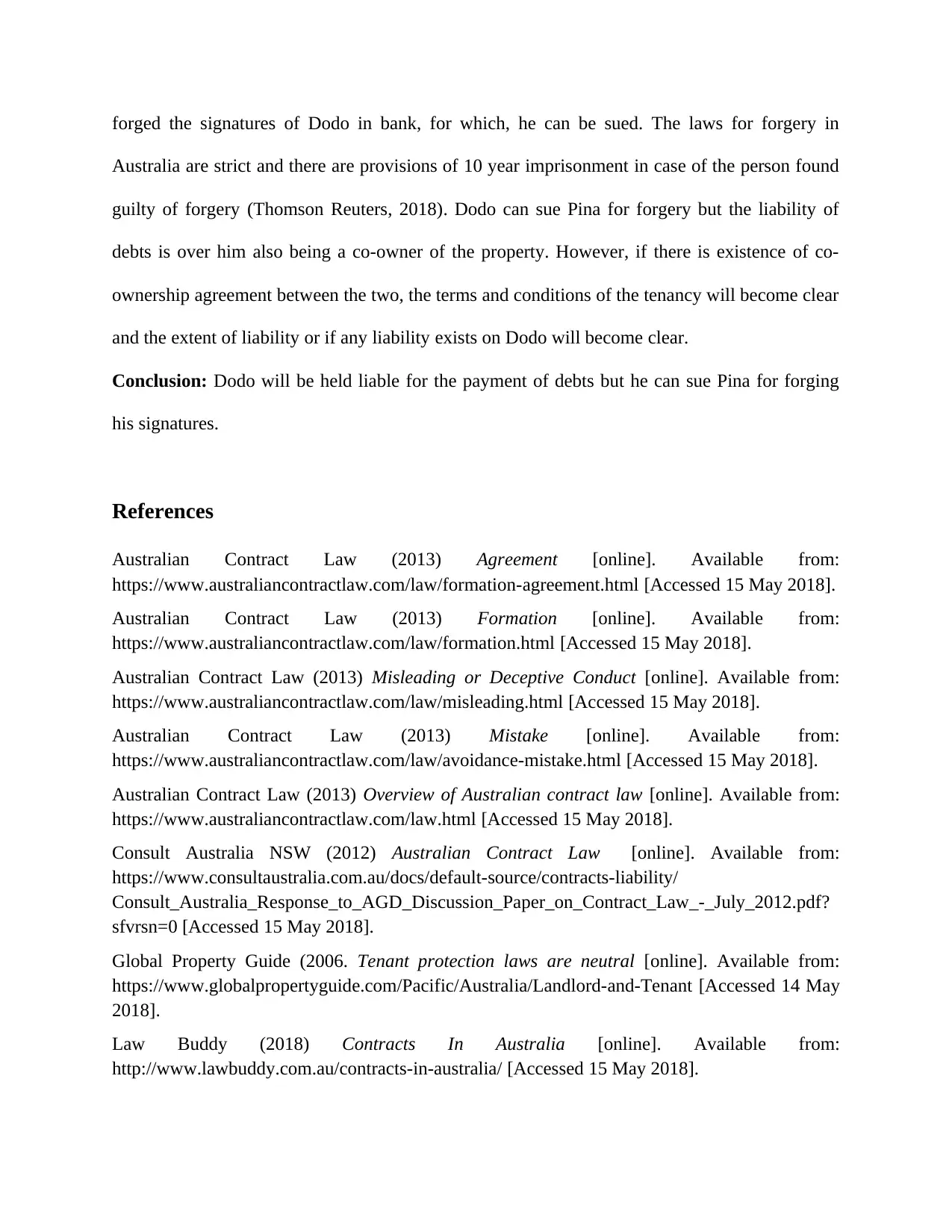
forged the signatures of Dodo in bank, for which, he can be sued. The laws for forgery in
Australia are strict and there are provisions of 10 year imprisonment in case of the person found
guilty of forgery (Thomson Reuters, 2018). Dodo can sue Pina for forgery but the liability of
debts is over him also being a co-owner of the property. However, if there is existence of co-
ownership agreement between the two, the terms and conditions of the tenancy will become clear
and the extent of liability or if any liability exists on Dodo will become clear.
Conclusion: Dodo will be held liable for the payment of debts but he can sue Pina for forging
his signatures.
References
Australian Contract Law (2013) Agreement [online]. Available from:
https://www.australiancontractlaw.com/law/formation-agreement.html [Accessed 15 May 2018].
Australian Contract Law (2013) Formation [online]. Available from:
https://www.australiancontractlaw.com/law/formation.html [Accessed 15 May 2018].
Australian Contract Law (2013) Misleading or Deceptive Conduct [online]. Available from:
https://www.australiancontractlaw.com/law/misleading.html [Accessed 15 May 2018].
Australian Contract Law (2013) Mistake [online]. Available from:
https://www.australiancontractlaw.com/law/avoidance-mistake.html [Accessed 15 May 2018].
Australian Contract Law (2013) Overview of Australian contract law [online]. Available from:
https://www.australiancontractlaw.com/law.html [Accessed 15 May 2018].
Consult Australia NSW (2012) Australian Contract Law [online]. Available from:
https://www.consultaustralia.com.au/docs/default-source/contracts-liability/
Consult_Australia_Response_to_AGD_Discussion_Paper_on_Contract_Law_-_July_2012.pdf?
sfvrsn=0 [Accessed 15 May 2018].
Global Property Guide (2006. Tenant protection laws are neutral [online]. Available from:
https://www.globalpropertyguide.com/Pacific/Australia/Landlord-and-Tenant [Accessed 14 May
2018].
Law Buddy (2018) Contracts In Australia [online]. Available from:
http://www.lawbuddy.com.au/contracts-in-australia/ [Accessed 15 May 2018].
Australia are strict and there are provisions of 10 year imprisonment in case of the person found
guilty of forgery (Thomson Reuters, 2018). Dodo can sue Pina for forgery but the liability of
debts is over him also being a co-owner of the property. However, if there is existence of co-
ownership agreement between the two, the terms and conditions of the tenancy will become clear
and the extent of liability or if any liability exists on Dodo will become clear.
Conclusion: Dodo will be held liable for the payment of debts but he can sue Pina for forging
his signatures.
References
Australian Contract Law (2013) Agreement [online]. Available from:
https://www.australiancontractlaw.com/law/formation-agreement.html [Accessed 15 May 2018].
Australian Contract Law (2013) Formation [online]. Available from:
https://www.australiancontractlaw.com/law/formation.html [Accessed 15 May 2018].
Australian Contract Law (2013) Misleading or Deceptive Conduct [online]. Available from:
https://www.australiancontractlaw.com/law/misleading.html [Accessed 15 May 2018].
Australian Contract Law (2013) Mistake [online]. Available from:
https://www.australiancontractlaw.com/law/avoidance-mistake.html [Accessed 15 May 2018].
Australian Contract Law (2013) Overview of Australian contract law [online]. Available from:
https://www.australiancontractlaw.com/law.html [Accessed 15 May 2018].
Consult Australia NSW (2012) Australian Contract Law [online]. Available from:
https://www.consultaustralia.com.au/docs/default-source/contracts-liability/
Consult_Australia_Response_to_AGD_Discussion_Paper_on_Contract_Law_-_July_2012.pdf?
sfvrsn=0 [Accessed 15 May 2018].
Global Property Guide (2006. Tenant protection laws are neutral [online]. Available from:
https://www.globalpropertyguide.com/Pacific/Australia/Landlord-and-Tenant [Accessed 14 May
2018].
Law Buddy (2018) Contracts In Australia [online]. Available from:
http://www.lawbuddy.com.au/contracts-in-australia/ [Accessed 15 May 2018].
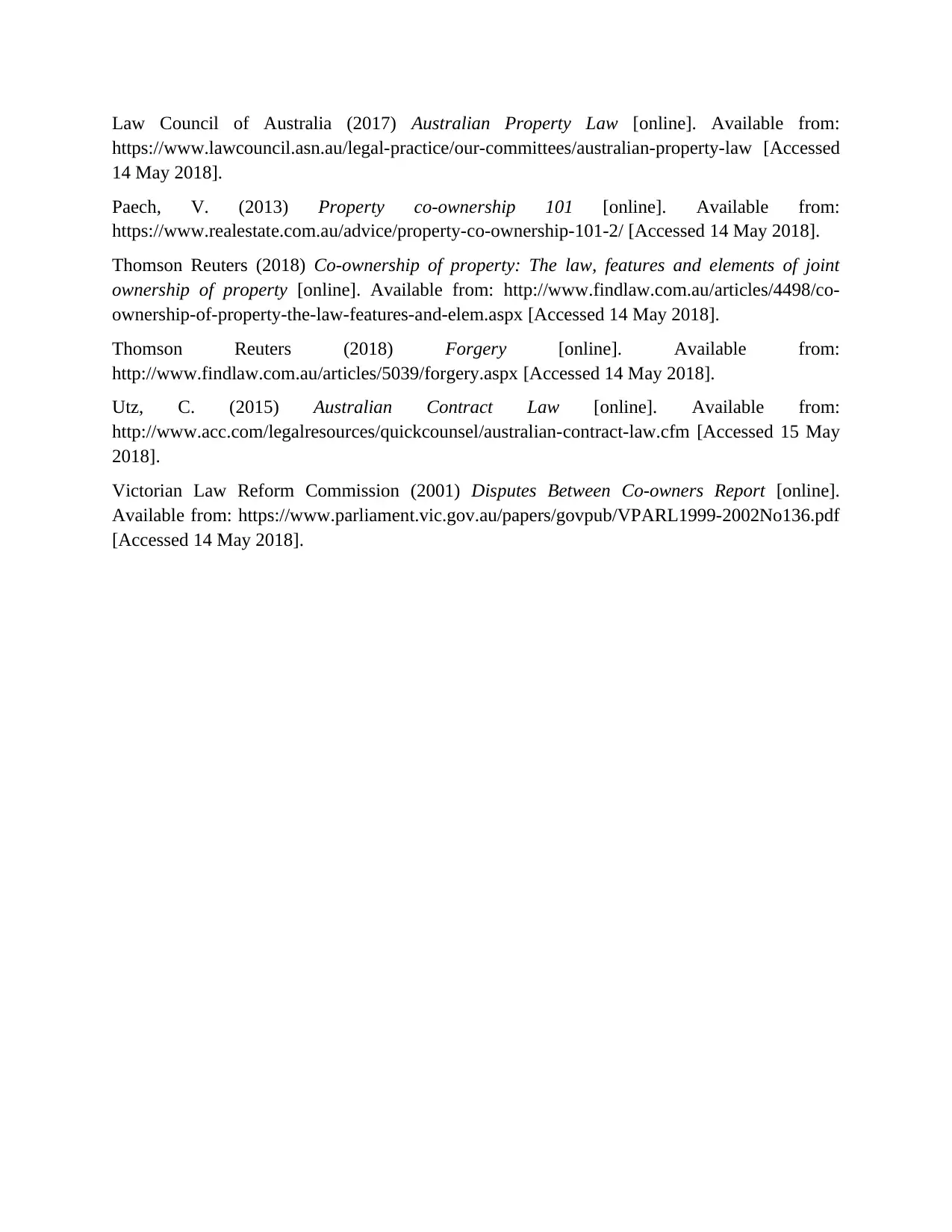
Law Council of Australia (2017) Australian Property Law [online]. Available from:
https://www.lawcouncil.asn.au/legal-practice/our-committees/australian-property-law [Accessed
14 May 2018].
Paech, V. (2013) Property co-ownership 101 [online]. Available from:
https://www.realestate.com.au/advice/property-co-ownership-101-2/ [Accessed 14 May 2018].
Thomson Reuters (2018) Co-ownership of property: The law, features and elements of joint
ownership of property [online]. Available from: http://www.findlaw.com.au/articles/4498/co-
ownership-of-property-the-law-features-and-elem.aspx [Accessed 14 May 2018].
Thomson Reuters (2018) Forgery [online]. Available from:
http://www.findlaw.com.au/articles/5039/forgery.aspx [Accessed 14 May 2018].
Utz, C. (2015) Australian Contract Law [online]. Available from:
http://www.acc.com/legalresources/quickcounsel/australian-contract-law.cfm [Accessed 15 May
2018].
Victorian Law Reform Commission (2001) Disputes Between Co-owners Report [online].
Available from: https://www.parliament.vic.gov.au/papers/govpub/VPARL1999-2002No136.pdf
[Accessed 14 May 2018].
https://www.lawcouncil.asn.au/legal-practice/our-committees/australian-property-law [Accessed
14 May 2018].
Paech, V. (2013) Property co-ownership 101 [online]. Available from:
https://www.realestate.com.au/advice/property-co-ownership-101-2/ [Accessed 14 May 2018].
Thomson Reuters (2018) Co-ownership of property: The law, features and elements of joint
ownership of property [online]. Available from: http://www.findlaw.com.au/articles/4498/co-
ownership-of-property-the-law-features-and-elem.aspx [Accessed 14 May 2018].
Thomson Reuters (2018) Forgery [online]. Available from:
http://www.findlaw.com.au/articles/5039/forgery.aspx [Accessed 14 May 2018].
Utz, C. (2015) Australian Contract Law [online]. Available from:
http://www.acc.com/legalresources/quickcounsel/australian-contract-law.cfm [Accessed 15 May
2018].
Victorian Law Reform Commission (2001) Disputes Between Co-owners Report [online].
Available from: https://www.parliament.vic.gov.au/papers/govpub/VPARL1999-2002No136.pdf
[Accessed 14 May 2018].
1 out of 9
Related Documents
Your All-in-One AI-Powered Toolkit for Academic Success.
+13062052269
info@desklib.com
Available 24*7 on WhatsApp / Email
![[object Object]](/_next/static/media/star-bottom.7253800d.svg)
Unlock your academic potential
© 2024 | Zucol Services PVT LTD | All rights reserved.



